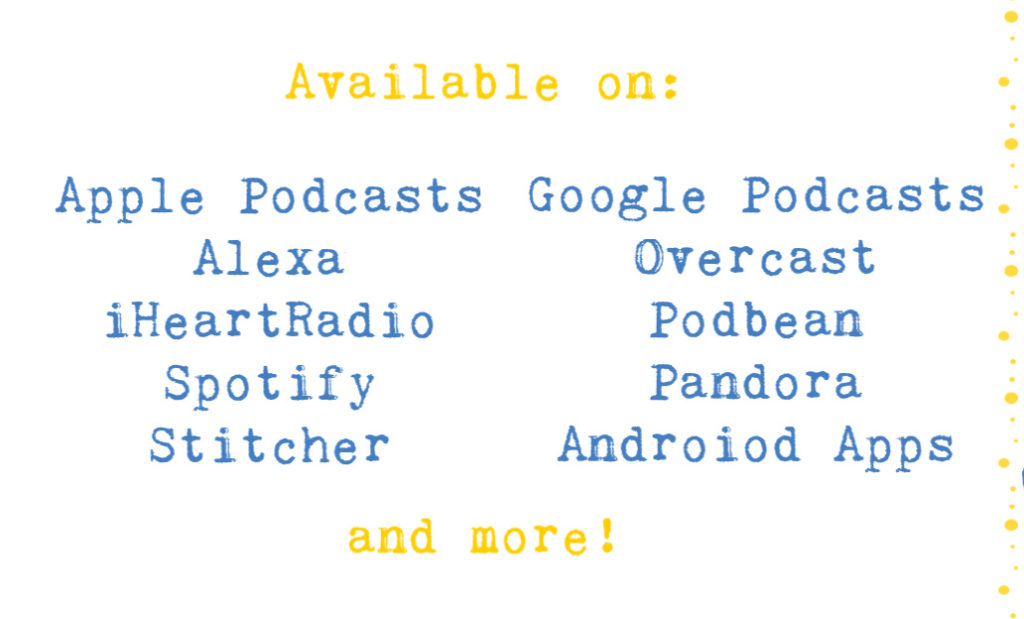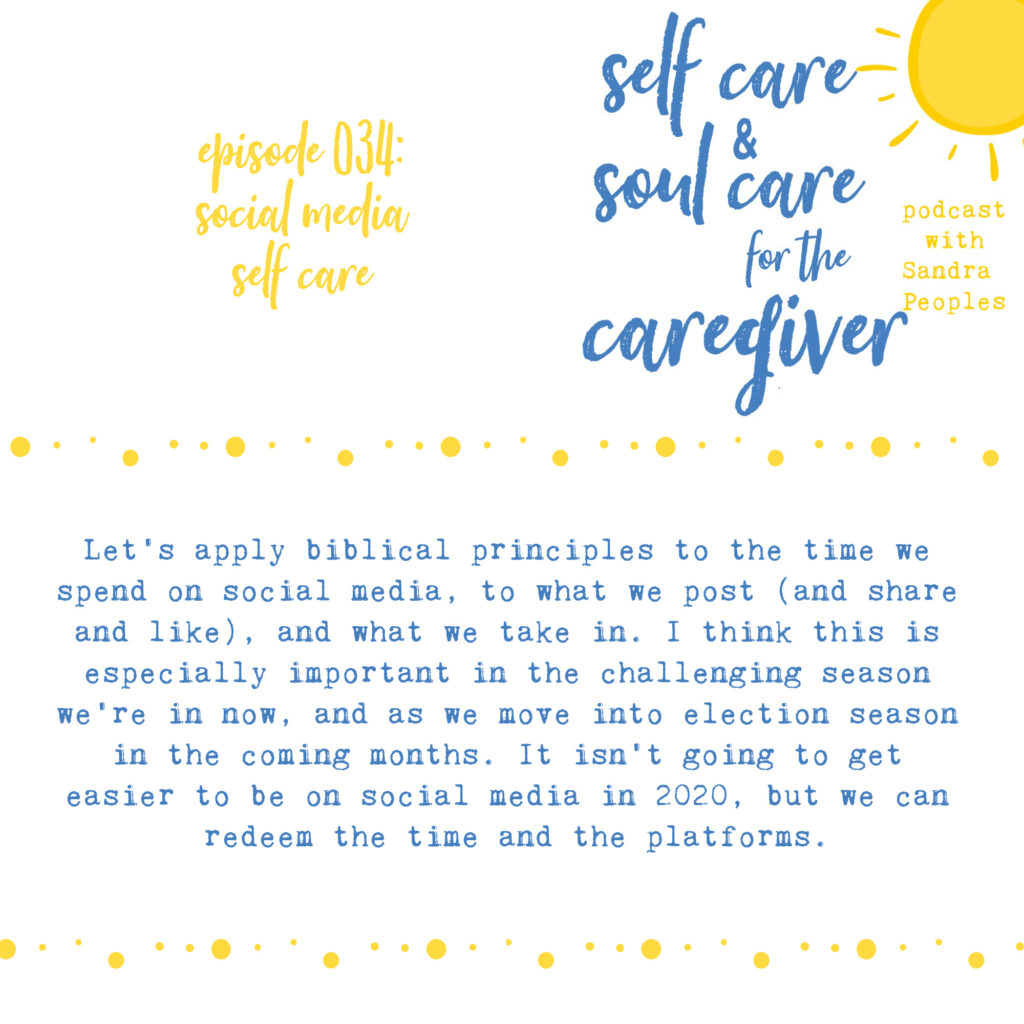This week we’re talking about social media through the lens of self-care. If you feel drained, stressed, or even angry after spending time on social media, this episode is for you. We’re going to talk about setting boundaries for what we consume and for what we post. I think both are necessary. What we’ll talk about today may be tough to hear and put into action, but your time on social media can be positive for you and even bring glory to God. Let’s apply biblical principles to the time we spend on social media, to what we post (and share and like), and what we take in. I think this is especially important in the challenging season we’re in now, and as we move into election season in the coming months. It isn’t going to get easier to be on social media in 2020, but we can redeem the time and the platforms.

Quick Links:
- Coronavirus, Conspiracy Theory, and the Ninth Commandment by David French
- Abiding Caregivers Facebook group
- SandraPeoples on Instagram

Transcript:
August 3rd, episode 34, Social Media Self Care
Hi, friends! This is self-care and soul care for the caregiver, and I’m your host, Sandra Peoples. To us, self-care isn’t a luxury, it’s a necessity. We’re abiding caregivers who want to take better care of ourselves so we’re able to care for our loved ones who rely on us.
This week we’re talking about social media through the lens of self-care. If you feel drained, stressed, or even angry after spending time on social media, this episode is for you. We’re going to talk about setting boundaries for what we consume and for what we post. I think both are necessary. What we’ll talk about today may be tough to hear and put into action, but your time on social media can be positive for you and even bring glory to God. Let’s learn how together.
I’d like to start off this episode with prayer, like we sometimes do when talking about something especially sensitive.
God, we are so thankful for opportunities to connect with others and build relationships. One of the ways we do that is through social media. But we admit it’s a struggle not to be addicted to our phones and instead to use them to honor You with what we take in and put out. We are thankful that Scripture is living and active and has principles we can put into action as we talk about this modern development. Help us to be open to what we’ll talk about today. God, convict my friends as you’ve convicted me if necessary. Help us to draw near to you with clean hearts and pure posts. In Jesus’s name, amen.
Ok friends, let’s jump in. Being on social media is kinda my job. When I was the editor for Not Alone and Key Ministry, I got paid to be on Facebook, Twitter, and Instagram. It was a pretty sweet gig. But it was also a challenge. There’s no time off from social media. Even if I scheduled everything ahead of time, I had to monitor comments and questions. And on pages as big as the pages I managed for them, there can be lots of comments and questions. So Christmas day, I was working. Easter? I was on. There were no days off. And that got to be pretty overwhelming for me. So overwhelming that it wasn’t healthy. I had to learn the hard way how to put up some boundaries when it came to my social media time.
Even though I don’t manage the social media for Key Ministry anymore, I do still manage my own social media. In fact, I’m an admin for six different pages, including our church where my husband is the pastor. And I run or help run that many Facebook groups. Plus my Instagram and Twitter pages. So I spend a lot of time on social media.
We could talk about whether social media or even specific sites are good or bad. But the truth is they are all tools. Tools are neutral, but the people using the tools are not. So during our time together today, I’d like to talk about how to make social media a good, useful tool. Let’s apply biblical principles to the time we spend on social media, to what we post (and share and like), and what we take in. I think this is especially important in the challenging season we’re in now, and as we move into election season in the coming months. It isn’t going to get easier to be on social media in 2020, but we can redeem the time and the platforms.

Let’s start with how to manage the time we’re on social media and find more joy. We’re going to walk through five steps together:
The first step is to pay attention to how you feel when you’re on social media
Social media site developers have created ways for you to get a dopamine hit each time you log on. Every thumbs up or heart on a post is a little hit. Those hits make you happy. You feel validated and valued as the number climbs. You keep coming back for more.
But the more often you come back, you the more you realize social media isn’t all likes and positive feedback. Sometimes it makes you feel jealous. Sometimes it makes you feel anxious. And when most of us feel jealous or anxious we reach for our credit cards to help us achieve a life like we see someone else showcasing or to calm our fears. Marketers love that! And they pay social media channels to put ads in our feeds that increase that FOMO. They profit from our attention every time we log in for that dopamine hit.
You can fight against this by paying attention to how you feel each time you log on. What feeling makes you pick up your phone? What feeling makes you click on a certain app? How do you feel when you’re scrolling? How do you feel when you see a certain person’s updates? What feeling makes you put your phone down? How do you feel when you walk away from it? Our feelings can be our guide to get to the root of our behaviors and will help us overcome the hold social media has over us.
Step 2: Track the Time You Spend on Your Phone
As we track how we feel being on our phones, let’s track something else as well—the time we spend on our phones. Our phones have built in trackers that help with this and can even break down the time into categories so you see where you’re spending the most time. Look back over the last week or month to see how much time you’re spending on your phone.
Step 3: Decrease Your Time on Social Media
First we pay attention to our feelings while on our phones, then we pay attention to our time when on our phones, now we can talk about ways to decrease that online time.
Here are a few steps I suggest:
- Hide the social media apps on your phone. Create a new folder on the last page so it’s hard to get to. Then each time you pick up your phone to check an app, you’ll have to stop and really think about whether you have the time and the desire to check it instead of relying on muscle memory.
- Take your charger out of your bedroom (or at least put it across the room from your bed). Your phone doesn’t have to be the first thing you check when you wake up and the last thing you check before you fall asleep. Put a little distance between you and the phone to develop new habits.
- Designate certain hours of the day as screen free. This is great to do with the entire family. Maybe it’s from when the kids get home from school until after dinner. Or maybe it’s between dinner time and bedtime. Less screen time is beneficial for everyone!
Step 4: Create feeds that allow you to enjoy the time you spend online and not focus on the FOMO.
I heard this quote from Mike Tyson and thought about how it applies to so many situations.
“Everyone has a plan, ’til they get punched in the face.”
Plans are good, but it often takes less than a punch to the face to change our plans. Even when we plan to spend less time online and set ourselves up for success, the truth is there are times we will be on our phones. And when that time comes, the best way to enjoy it is to create social media feeds that encourage you instead of causing the negative emotions you sometimes feel.
Here are some steps I’ve taken to turn down the noise of social media in my feeds:
- I’ve turned off all my notifications. I can check social media and email when it’s convenient for me, not every time my phone dings. (The only app left on is texting because that’s how my husband and older son communicate with me throughout the day.)
- I mute, hide, or unfollow any accounts I don’t want to see. I can remain friends with people on Facebook and not see what they post every day.
- I unliked pages that I’m not interested in anymore. You can look at all the pages you have liked and “unlike” them from that list. Makes it quick and easy!
- I turned off Facebook notifications in groups. I love groups. They are one of the main reasons I stay on Facebook! But it’s easy to get overwhelmed by all the activity in some of them! Turning off notifications, or at least turning them off for everyone except friends, helps me keep loving groups.
It’s good and healthy to set some boundaries on what you see during the time you’re online.
Step 5: Decide what you are going to do with the hours you gain back when you limit your phone time
James’s very first occupational therapist taught me that we don’t stop habits and behaviors—we replace them.
If I decide to spend less time on my phone each day, I need to add new activities so I don’t keep reaching for it.
Here’s what I’ve added to my daily routine to replace those online hours:
- Reading more books. I love to read, but now I’m making the deliberate decision to pick up a library book instead of picking up my phone when I have a few minutes between activities.
- Projects around the house. Once I tracked my online time, I realized I only thought I didn’t have time to do projects around the house. Even though the process may not spark joy every day, the result does (for me and my family).
- Investing in real relationships. I do focus more on how my phone helps me connect with real people (through texting and apps like Voxer). It certainly strengthens the relationship in a way that hitting like on their post can’t do!
What have you always wanted to do but not felt like you had time for? Learn to knit? Paint? Play the piano more often? Write a book? When you look at the hours you spend online and decide to redeem that time, just imagine what you could do that you would really enjoy!
Ok, now let’s shift from what you see on social media to what you post and share!
First let’s ask what biblical principles apply to our our time on social media. There are certainly verses from Proverbs that apply, like 13:3 “Whoever guards his mouth preserves his life; he who opens wide his lips comes to ruin,” and 25:11 “A word fitly spoken is like apples of gold in a setting of silver.” But my favorite is in the book of Philippians. 4:8 says, “Finally, brothers, whatever is true, whatever is honorable, whatever is just, whatever is pure, whatever is lovely, whatever is commendable, if there is any excellence, if there is anything worthy of praise, think about these things.” If these are the things I’m supposed to think about, they also describe what I should post about.
The first requirement on the list is that it’s true. I think this truth is more than just something that’s clearly true or clearly a lie. The 9th commandment says “You shall not bear false witness against your neighbor.”
The Westminster Larger Catechism expands on that even more. The language is a little old fashioned, so stick with me as I read:
The duties required in the ninth commandment are, the preserving and promoting of truth between man and man, and the good name of our neighbor, as well as our own; appearing and standing for the truth; and from the heart, sincerely, freely, clearly, and fully, speaking the truth, and only the truth, in matters of judgment and justice, and in all other things whatsoever; a charitable esteem of our neighbors; loving, desiring, and rejoicing in their good name; sorrowing for, and covering of their infirmities; freely acknowledging of their gifts and graces, defending their innocency; a ready receiving of a good report, and unwillingness to admit of an evil report, concerning them; discouraging talebearers, flatterers, and slanderers; love and care of our own good name, and defending it when need requireth; keeping of lawful promises; studying and practicing of whatsoever things are true, honest, lovely, and of good report.
Journalist David French wrote a really helpful article on this that I’ll link to in the show notes. Here’s a quote from it: “If a person understands those obligations—if he truly comprehends his duty to his neighbor—will he be a sponge for the worst and most paranoid accusations? Absolutely not. He’ll be inoculated against them.”
As you are scrolling through Facebook and you see something interesting (or sensational!), before you read it, believe it, and share it, you first have to ask if it’s true. Is it from a reliable source? Does it assume the best about the people involved? That’s part of applying the 9th commandment. If it isn’t true, or you aren’t sure if it isn’t true—don’t share it.

Let me share an example that was especially hurtful to me. There’s a woman with a popular Facebook page who I used to follow but haven’t in a while. But I saw more of her things shared, so I clicked over. Friends, it’s full of accusations against pastors of churches who are making decisions different from what she believes they should do. One post even said thousands of pastors closed their churches and took money from the government.
My husband is a pastor. Many of our friends are pastors. Not a single one transitioned their churches to being online without praying, evaluating, and even grieving over the decision. And certainly, none of them took government money while closed (even though if they qualified for the small business loan and were approved, it was legal for them to do so. And if giving was down to the point bills weren’t getting paid and they couldn’t meet their obligations to pay the staff, they could take a loan with a plan to pay it back. Churches take loans often, like for building projects). So when this woman with thousands of followers told a lie, something she can’t prove, has no evidence for, and doesn’t assume the best of fellow Christ followers, she is breaking the 9th commandment. And if you share it, you are complicit in that. And the pastors and pastors’ wives you know see that on your page and are hurt by that. So not only are you complicit in a lie, you are hurting the people you care about by sharing that post.
Back to our verse in Philippians, what else does it say we should focus on besides what is true? “whatever is honorable, whatever is just, whatever is pure, whatever is lovely, whatever is commendable, if there is any excellence, if there is anything worthy of praise …” So there could be stories that pass the truth test, but aren’t worded in a way that is honorable or just to the person or situation it’s describing. I can think of lots of examples from my newsfeed in just the last week, and I bet you can too.
Here’s the bottom line, In Matthew 12:36, Jesus says, “I tell you, on the day of judgment people will give account for every careless word they speak,” and I believe that includes everything we post and share. What I share can draw people closer to Christ, or it can push them further away. I fear that lots of what’s getting shared right now, every post that starts with something like, “Wake up people!” or “Watch this before Facebook takes it down” or accuses the “mainstream media” of widespread deception is showing an unbelieving world that we Christians will believe and share anything. And they cast doubt on the ultimate truth we believe—that the death, burial, and resurrection of Christ allows us to be forgiven of our sins and restores our relationship with God.
My prayer for you is that you will create social media feeds that encourage you and even help you grow in godliness. And I pray you will pause before liking or sharing stories that violate Phil. 4:8, the 9th commandment, or even common sense.
Please friends, an unbelieving world needs to find your social media posts believable. They need to know more about the God you serve than your medical, political, or media opinions. Being divisive or unkind isn’t worth the damage it does to your reputation as a Christian and to the relationships you have with people who love you and want the best for you.
Thank you for spending time with me today, especially as we tackled such a big topic! Making our time online more positive will help our mental health and allow us to find more joy in the lives God has called us to. This week we’ll be talking more about this on Instagram and in the Abiding Caregivers Facebook group, so join me there! I’d love to hear what works for you. Remember, apart from Christ we can do nothing, but with Him, we have everything we need as we live out our calling as abiding caregivers.



